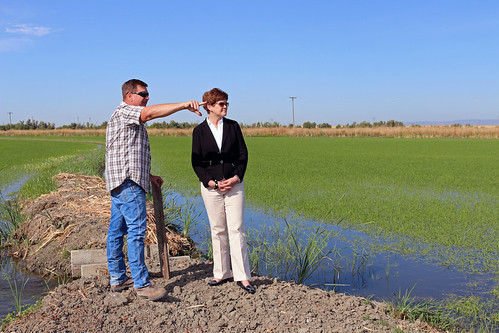
This summer, USDA is highlighting partnerships to invest in the future of rural America. Our partners work with us year after year to leverage resources and grow economic opportunities. They are the key to ensuring our rural communities thrive. Follow more of our stories at #RuralPartners.
My passion and commitment for conservation started on the farm learning from our first and finest conservationists: American farmers. Our nation’s farmers and ranchers care deeply about the land, which is why they are incredible environmental stewards. Earlier this month, I visited the Yolo Bypass Wildlife Area, a popular wildlife refuge just minutes from downtown Sacramento. Here, farmers like the DeWit family are growing rice and providing some of the best wildlife habitat in North America.
Mike DeWit and his father, Jack, brought me right into the middle of the Sacramento Valley rice fields, where more than a half million acres are used as a source of America’s sushi rice. Equally valuable is the role these rice fields play as a habitat for nearly 230 wildlife species, including providing nearly sixty percent of the winter diet for millions of migrating ducks and geese. It was a thrill to walk on the levee of a shallow-flooded, brilliantly green field and observe several pairs of nesting American Avocets all around. When I noticed a nest with four small eggs, I knew that it represented a part of the future generation of wildlife.
It’s partnerships like those modeled by the DeWit family and others –working alongside organizations like Audubon California, Point Blue Conservation Science, The Nature Conservancy and Ducks Unlimited – that truly showcase the great conservation work that our farmers and ranchers do every single day. These partnerships are the key to identifying important resource issues in different areas and the key to successful conservation.
USDA recently launched a new conservation initiative, the Regional Conservation Partnership Program (RCPP), a program that goes beyond traditional government support for conservation and allows businesses and other for-profit partners to invest in regional conservation projects. RCPP will help fund local conservation programs through a $1.2 billion investment from USDA over the life of the Farm Bill and leverage an additional $1.2 billion from private partners for a total of $2.4 billion. These conservation projects will help improve soil health, water quality and water use efficiency, wildlife habitat, and other related natural resources on private lands. In addition to conservation, the projects create economic growth in agriculture, hunting and fishing, outdoor recreation, and tourism.
The DeWit’s rice field in the Sacramento Valley is one of eight critical conservation areas designated nationwide. Established through the RCPP and designated by the Secretary of Agriculture, USDA works with Critical Conservation Areas to build on existing, strong partnerships in these regions to accelerate conservation needs and target federal funds. This allows farmers to conserve the natural resources we depend on, while at the same time boosting their operations for the long-term.
The caretakers of our land are growing more than food; they’re providing a home for an amazing array of wildlife. Through RCPP we’re hoping to lead a new venture conservationist movement that empowers and launches new, high-opportunity start-up partnerships that deliver locally-led conservation solutions.
By employing the most innovative conservation practices around, farmers and ranchers like the DeWits will continue to build on their role as the most prominent stewards of the environment which will benefit all Americans for generations to come.

